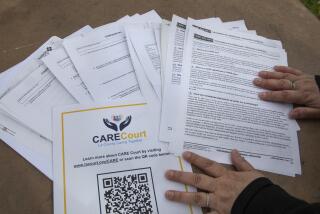Sept. 11 Pushes Employees to Make a Self-Help Discovery
- Share via
The intense anxiety, sleepless nights and depression that followed Sept. 11 prompted many Americans to seek professional counseling, perhaps for the first time in their lives. For many of those people, the first step was a phone call to an employee-assistance program, a service that is available to more than 65 million U.S. workers.
More than 900 companies requested help in coping with the crisis in the week after the events in New York and the Washington, D.C., area, according to Magellan Behavioral Systems, a major supplier of employee-assistance programs to American business. The number of calls to such programs rose about 20% nationwide, according to WellPoint, another company that offers them. The aftermath of Sept. 11 provided many workers with their first glimpse of such services and also heightened the visibility of these programs, which can be an important resource for dealing with the difficult issues of everyday life. Many consumers don’t appreciate the role these programs can play in helping people cope with personal or family emotional problems, and that they allow workers to seek short-term mental-health care without tapping their regular health insurance.
They are an outgrowth of counseling programs that began 50 years ago to help workers with alcohol-related problems. They expanded in the 1970s to help with drug-abuse problems, particularly for children of employees, and later to include marriage and relationship counseling. In the 1980s, some programs began offering assistance with child-care issues or situations involving aging parents.
The program’s goal is to help with worker productivity. It is a tool that tries to reduce stress on the job, cut down on absenteeism and cut back on distractions for workers. About 70% of companies with 500 or more workers have employee-assistance programs. Cost is relatively cheap: Companies pay, on average, about $11.40 a year per worker, according to Open Minds, a survey company that follows the industry.
It is important to remember, however, that the counseling is designed for short-term assistance with problems that are moderate in nature. It’s not intended for people with clinical depression or who need long-term psychotherapy. Most employee-assistance programs will pay for three to six counseling sessions in which people can discuss problems they are having at work or home.
Program counselors, usually psychologists or social workers, are ethically bound to keep the discussions confidential, with no reports to corporate management. “Our feeling is, if you don’t have confidentiality, then you don’t have an EAP,” said Stuart Hales, communications director for the Employee Assistance Professionals Assn. in Arlington, Va. Most companies have a toll-free number that workers can call to speak to a counselor and arrange for an appointment.
The most common reason that people contact the assistance programs are for what health professionals call an “adjustment disorder,” such as a marital breakup. “You need somebody to talk to,” said Russ Newman, executive director for professional practice at the American Psychological Assn. “A rapid assessment is done and there is a rapid attempt to solve an immediate problem.”
Studies have shown that about half the people who receive mental health services show measurable improvement--defined as feeling better and functioning better at home and work--within eight counseling sessions.
Traditionally, some people have not sought help for emotional problems or mental illness because they feared they would be stigmatized if others found out. But such concerns seem to be lessening with younger workers, said Jody Dean, a psychologist who manages employee-assistance programs at Hughes Electronics in El Segundo. “We have a very young company--the average employee is 33 years old,” said Dean. “To them, seeing a therapist is a regular part of their life. You work out, do yoga and see a therapist.”
One obvious advantage of employee-assistance counseling over, say, therapy services under regular health insurance is that it is free: There are no deductibles or co-payments, nor do you need to get a referral from a primary care doctor.
Essentially, you decide whether you need to get professional help for whatever is bothering you. “These are the problems of daily life everyone deals with, problems not considered a mental illness,” said Cheryl Montero, head of mental health services for WellPoint, the health insurance company that operates Blue Cross of California. Getting something resolved in five visits “may prevent the issue from turning into something more serious six or eight months later,” she said.
With regular health insurance, mental health benefits typically are limited: For example, your plan may put a cap on the maximum number of visits allowed to a therapist in a year. A good employee-assistance counselor will act as an advocate, helping the patient get to the next level of needed care. The counselor can make a referral to a psychiatrist or therapist within the patient’s regular health insurance programs. And he should also be knowledgeable about community resources, local mental health agencies, drug and alcohol self-help groups.
“As the health insurance system has gotten more difficult to navigate, EAP personnel have taken on the role of advocate,” said Newman of the America Psychological Assn. “They will help people get the most out of their insurance plan benefits,” he said.
*
Bob Rosenblatt welcomes your questions, suggestions and tips about coping with the changing world of health care. Contact him by writing Bob Rosenblatt, Health, Los Angeles Times, Times Mirror Square, Los Angeles, CA 90053, or by e-mailing bob.rosenblatt@latimes.com. Dollars & Sense runs the fourth Monday of each month.
More to Read
Inside the business of entertainment
The Wide Shot brings you news, analysis and insights on everything from streaming wars to production — and what it all means for the future.
You may occasionally receive promotional content from the Los Angeles Times.








